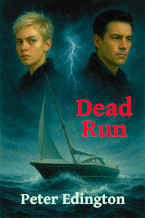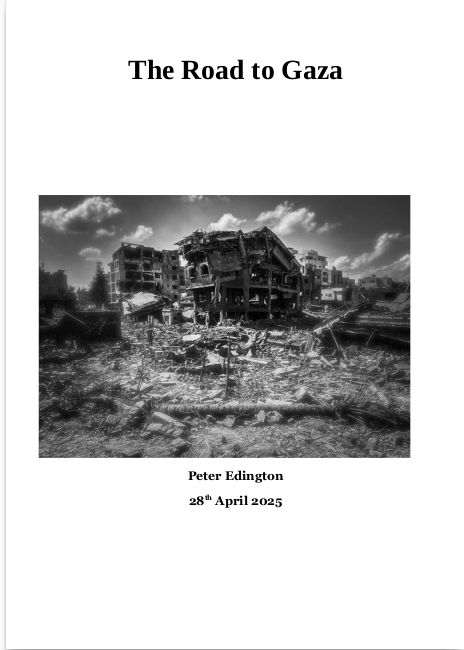Author
Peter Edington - Author
"The idea for my first novel came from the true account of the discovery of Spanish treasure ship, missing for four hundred years. I chose Central America's Caribbean coast as the area where my ship had been wrecked. What a fantastic region. The more you research it, the more incredible its history becomes.
The Colombian Exchange is that first novel. More than just a thriller, it reflects some of the politics and history of Nicaragua in the days of Anastasio Somoza's dictatorship.
Since finishing that book, I have completed one I started way back, after my first voyage across the Atlantic Ocean - Dead Run- a fast moving chase thriller.
Today I'm working on a full blooded political-thriller, Viva!, a trilogy based once again in Central America. It reflects the turmoil of two brothers caught on opposite sides of a civil war that divides not only a country but a family."
 Author
Author
Peter Edington was born in Aberdeen, Scotland in 1951 and lived in Malaya, where his father was attached to the Malay Regiment during the unrest of the early fifties.
In England, he was educated at Bedford School and went on to work with an old-established firm of Solicitors in Exeter, where he spent much time preparing criminal cases for clients on remand in the town’s jail. In 1974 he went to Guildford College of Law.
In 1982, he moved with his wife and three daughters to Shropshire, from where he taught Law and Business Management to General Motors dealerships around the United Kingdom.
By 1989, he had succumbed to the call of the sea and decided on a sixty-foot sailing boat. It took three years to complete while he continued to work as a lecturer but in September ‘92 the new boat was launched in Plymouth.
The author and his family spent the next two years sailing in the Mediterranean, the Atlantic Ocean and the Caribbean.
In April 1996, he began his first book. Since then he has written two full-length novels, The Colombian Exchange and Dead Run. His third, "Viva!" is a trilogy based in turbulent Central America, an area he has come to know well. He has been represented by the Tamar Karet Literary Agency in London.
Peter's articles have been printed in British national and local newspapers and magazines and he has appeared on national Television and radio. To celebrate the millennium, he sailed half-way round the world to Australia with his family on their yacht. During this trip, the BBC made a video documentary of their voyage up the Gambia River in West Africa to deliver cataract lenses to a bush hospital 200-miles up-river for Sight Savers International. Here, Gambian surgeons performed over two hundred eye operations, restoring sight to many local villagers.
The author sailed into Sydney on the eve of the new millennium to experience life down-under. He has now started writing "Viva!"
The Colombian Exchange

Synopsis
Cody interrupts her, "What is the Colombian Exchange?"
"You know," says Tanya, "the cultural interchanges of Post Colombian colonisation - the interaction between the Old World and the New."
Cody laughs. "You call that an exchange?"
Nicaragua, November 1974.
The Prisoner:
Desperate - a hostage incarcerated on the Moskito Coast of Nicaragua - marine archaeologist Tanya Mitchell is carrying the child of the man she believes she killed. She doesn't realise that her incarceration was triggered by her discovery of the missing treasure ship the Santa Margarita, or that the man she thinks of as her mentor is effectively her jailer.
The Priest:
Working in a Catholic mission in Managua while he awaits ordination, Bob Cody feels certain of his faith, but unsure of his Church's commitment to his work. When he's asked to go and see a prisoner in the remote village of San Blas, he finds he has to make a choice: Tanya Mitchell or the Church.
The Colombian:
Dr. Paul Robertson-Nash, whose English veneer belies a childhood spent in Colombia.
The Conspiracy: When Tanya Mitchell discovered the whereabouts of the Santa Margarita in the course of doing some research for him, Paul Robertson-Nash seized the opportunity. Here was his chance to have the fabulous jade of the Mayans, as well as the unanimous acclaim of his peers in the world of marine archaeology, and the lovely Tanya for good measure.
And he knew how to get them. His old friend Juan Lopez was desperately seeking cash to fuel the revolution against the American-imposed dictatorship of Anastasio Somoza in Nicaragua, and so they cut a deal: In exchange for guaranteeing safe access to the ship, Lopez would get half the treasure.
But then things got in the way. First Tanya fell in love with another man - the expedition diver, Jimmy Haynes. Then Lopez insisted on taking charge of Tanya. Unable to let her go free till after his coup, he had her secured on the tropical Moskito Coast. And this is where Bob Cody finds her eight months later.
As he unravels the conspiracy about the Santa Margarita's treasure, Cody fears for Tanya's life. And now he is in danger, too, since they both know too much. He manages to engineer their escape, but life on the run in the jungles of the Moskito Coast, with a heavily pregnant woman, is hardly less dangerous - especially once the ruthless Paul Robertson-Nash joins in the manhunt.
Dead Run - Audio book

Synopsis
Tom Walton, divorced solicitor, takes the dangerous step of using money from his clients’ bank account to keep the taxman at bay. It might have worked if book-keeper, Dorothy Brown, had not been so efficient. Faced with her accusation, Walton sees prison looming, but his anarchic girlfriend, Jenny Lindt, proposes an alternative.
Resourceful, attractive and hard-up, young Jenny had hoped Walton was her stepping-stone out of the gutter. She is not about to let this new turn of events stand in her way. Scarred by the events of her adolescence, and by her sister's suicide, she finds relationships hard – except where they are relationships of a financial nature. “Take the money and run,” she says. “Empty the whole bloody lot into a suitcase and go. Free!"
Encouraged by her determination, Walton acts quickly to persuade Chi Deong Wu (known as Eddie Woo) - casino owner and gangland boss - to cash a bank draft for the rest of the money in the Client’s Account.
But before Walton and Lindt have even left the country, Woo discovers that, instead of having earned a healthy commission, he is nearly three hundred thousand pounds out of pocket. Woo joins Detective Sergeant Burbidge in a hunt for the two criminals. But where DS Burbidge's jurisdiction ends with the south coast of England, Woo's drug-dealing net spreads all the way to the Caribbean, where the fugitives are headed.
Walton, who grew up on the East Coast, and raced yachts at Law School, steals a sailing boat and he and Jenny slip quietly away from England’s shores, landing briefly in the Channel Isles to transfer their stolen money to an anonymous Caribbean tax haven. But the price that Jersey banker, Paul Davies, asks of Jenny is more than Tom Walton can stomach.
Affected by dramatic events that happen later in their voyage, Jenny puts another’s life before her own for once. From here the hunt takes the couple to the coral strewn ‘Caicos Bank’ where their yacht weaves and squirms amongst the reefs in a desperate attempt to avoid the implacable Eddie Woo.
The final action takes place on the barren, desert-island of Ambergris Cay, where Woo and Walton come face to face for the last time. And Jenny has to decide if she really wants to share her life with this criminal lawyer.

Viva!
Synopsis
A young women pauses on the steps of an airliner. She raises a machine gun and announces to the TV cameras, "We are not supermen, we are mothers of children, nurses, peasants, whose lives sum up all the exploitation of our people."
"Viva!" covers much more than a people's struggle for freedom. It is the story of love and revolution within a family.
The Villanueva family:
The father, Rodrigues. Wealthy, conservative, naturally supports the Somoza regime.
The mother, Olivia. Once bohemian and artistic, rejected by her husband after the caesarean birth of her second son, Rafael, leaves her sterile.
The brothers,
- Older brother, Miguel. Right-hand man in his father's business. Intuitively supports Somoza, loves the high life, jealous of Rafael's girlfriend.
- Younger brother, Rafael. Poet and intellectual, university student, in love with Julia.
Julia Larios - Daughter of a lawyer, lives next door and has grown up practically a sister to the two Villanueva brothers but now jealousy threatens the childhood friendships.
Book One opens
Sandinista guerrillas have stormed the house of President Somoza's chief minister, Chema Castillo. Thirty-four people from Managua's richest families are taken hostage. Among the assault team of teenagers is Rafael, now an experienced fighter, known only by his nom-de-guerre, the Poet.
1967, before Rafael became a Sandinista: His two best friends from university, Sergio and Anna have been killed, along with 600 other men and women, by Somoza's National Guard at an anti-government rally. Witnessing this fundamentally changes him, his relationship with his parents and with Julia. Marxist friend, Daniel, persuades him that the only way to oust the brutal dictator, Anastasio Somoza is by public insurrection.
The revolution will need money so Daniel proposes to rob a bank. Rafael is against it but is implicated by association when Daniel is arrested. He knows that, like Daniel, he will be imprisoned and tortured. He must flee. He takes Julia to his father's villa and tells her he will join the guerrillas in the north. They make love for the first time and they swear fidelity.
So begins Rafael's life as an outlaw. His father disowns him and makes his mother promise never to speak of him. His brother,Miguel, sees his opportunity to move in on Julia.
Rafael's guerrilla column is routed and Rafael is seriously wounded. He would have died but for a peasant family who shelter him – even though the National Guard is ransacking farms and massacring thousands around them. Recovered enough Rafael returns to an underground Sandinista group in Managua. But each week another activist is arrested or killed.
Olivia learns that her son is back and meets him, with Julia, at the villa. They can't accept his dream of an armed insurrection that could leave him and thousands like him dead and Julia is torn between her love for the passionate Rafael and the security that Miguel can offer.
Viva!
Chapter One
Chapter Two
Chapter Three

The Road To Gaza
To view the whole catastrophe of Gaza from an October 7th standpoint is to start the book at chapter 9. Here we zoom out to gain a wider, historical perspective.
The Road To Gaza, a history
Contact: If you would like to know more about The Colombian Exchange, do email me at PeterEdington_Author@proton.me.


